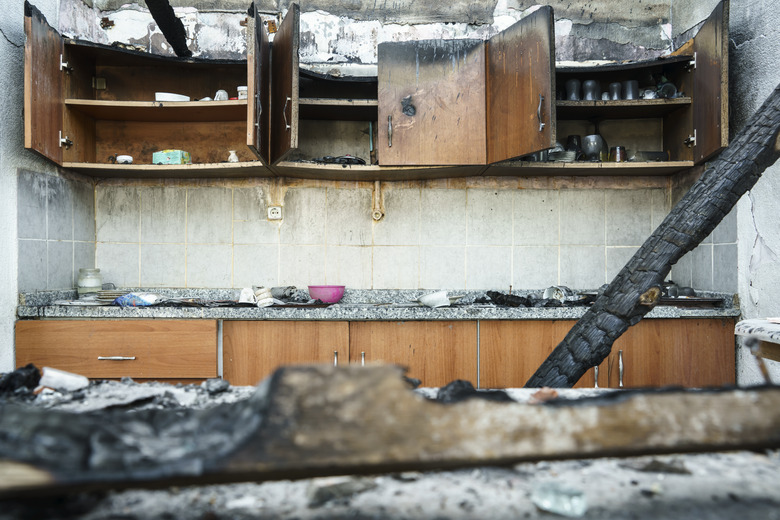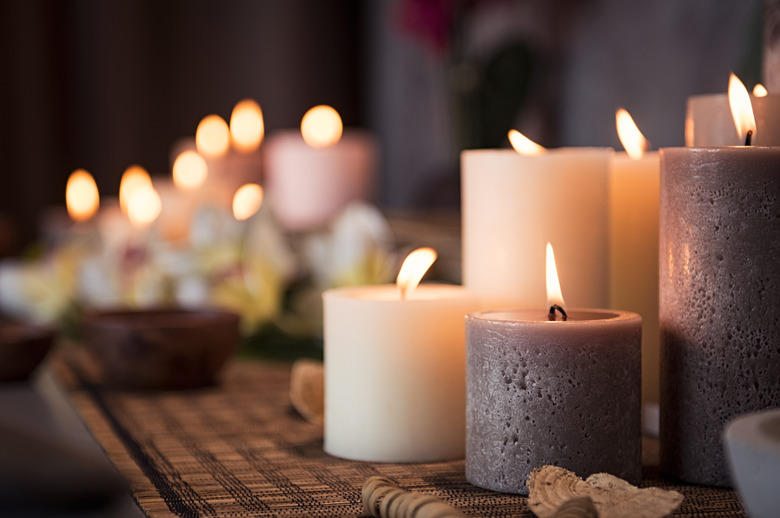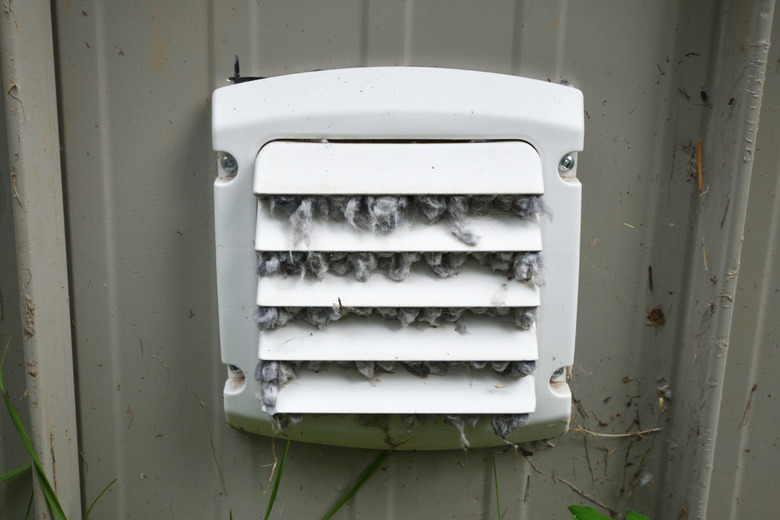The 10 Most Common Fire Hazards In Your Home
The potential for fire hazards exists in every home — no matter the age, type or size. Although electrical fires do occur, it's often simple oversights that are responsible for house fires, such as leaving a dish towel near the stove burner or burning candles and then falling asleep. Being aware of these common causes of home fires is the first step to preventing a tragedy or thousands of dollars in property damage. Pair this with a trusty smoke alarm and an escape plan in case of emergency and you'll have everything you need to protect your family from a fire.
1. Flammables Near the Stove
1. Flammables Near the Stove
Cooking in an area with limited nearby counter space often means items sit just a close distance from the stove, such as an oven mitt, recipe book or food packaging. Paper, cardboard or even a fabric oven mitt coming into contact with a hot stove burner could cause a fire, especially with a gas stove. To prevent such fires, keep any flammable materials well away from the stove burners while cooking.
2. Unattended Cooking
2. Unattended Cooking
Unattended cooking is a top cause of residential fires. Besides flammables near the stove, foods cooking on the stove or in the oven, toaster or toaster oven may burn or even cause a fire if the heat is up too high, and no one is in the kitchen for minutes at a time. Never leave the home for a quick trip to the store while a meal is in the oven. Even trying to multitask in a nearby room could be cause for concern if you momentarily forget that something's cooking in the kitchen. Also make sure young children aren't in the kitchen if you step into an adjacent room for a moment, as they might be curious and burn themselves or accidentally cause a fire.
3. Stove Top Grease Fires
3. Stove Top Grease Fires
When cooking oil gets too hot in a frying pan, it smokes, boils and may cause combustion, which is why you should never leave the room when frying foods on the stove. A grease fire atop a stove quickly gets out of hand, especially if water is used in an attempt to extinguish it. Since water and oil don't easily mix, the water simply displaces the grease and flames, making them spread even farther. Instead, turn off the burner and place a metal lid or a cookie sheet over the flaming pot or pan. Then, use a kitchen fire extinguisher to put out flames. If the fire gets out of hand, leave the home immediately and call 911.
A smoke detector is also a good line of defense, as it may sense the smoke from the grease before the pan bursts into flames. Be sure to replace the batteries every year and occasionally test the detector.
4. Candles and Cigarettes
4. Candles and Cigarettes
Much like foods cooking in an unattended kitchen, lit candles or cigarettes could start a fire if used carelessly. Never use candles near flammable items, as even a slight breeze or an unexpectedly tall flame could catch such items on fire. Likewise, lighting candles at night for ambiance and then falling asleep could lead to a major fire. Use battery-operated faux candles if you enjoy the look of a candle flame at bedtime. On the dinner table or in the living room, make sure any form of drip candle has a means to catch the wax or only use candles in jars so the hot wax can't spill onto other areas.
When it comes to cigarettes, never smoke in bed. Do not put a cigarette butt in the trash can if you've just put out the cigarette; instead, use an ashtray and discard its contents when you're sure they're at room temperature.
5. Damaged or Misused Electrical Cords
5. Damaged or Misused Electrical Cords
Electrical cords could cause fires if they're damaged or misused. Cords get warm or even hot when in use, so an electrical cord with damaged coating and exposed wires could cause a fire in the damaged spot. A cord with an electrical short could cause an electrical arc and spark, starting a fire.
Misusing an electrical cord, such as plugging an air conditioner into a light-duty cord, could also overheat the cord and cause a fire. Use a heavy-duty extension cord if you are plugging in an electrical appliance that requires a lot of power. The same holds true with power strips; never plug a space heater, toaster oven or similar item that draws a lot of current into a strip that's not designed for such use.
6. Overloaded Electrical Circuits
6. Overloaded Electrical Circuits
Overloading an electrical circuit is potentially more dangerous than overloading a power cord or power strip, as your home's wiring is running through walls, floors and ceilings. Overloading circuits sometimes happens by plugging appliances and several other devices into multioutlet converters or even by plugging an air conditioner and refrigerator into the same outlet, for instance. If lights frequently flicker in your home when a refrigerator or air conditioner fan kicks on, you may have an overloaded circuit.
If you hear crackling or buzzing near an outlet or if certain circuit breakers trip frequently, the circuit may be overloaded or have another issue. Hire an electrician to inspect or possibly reroute some items leading to the overloaded circuit to reduce the load on that circuit.
7. Christmas Tree Fire Hazards
7. Christmas Tree Fire Hazards
A Christmas tree that's dry enough to drop needles is also dry enough to go up in flames quickly. Placing candles near a Christmas tree or placing the tree close to a wood fireplace that's used during the season is one of the most common fire hazards. Old incandescent Christmas lights that get hot to the touch can also create enough heat to ignite the tree. Instead, switch to LED lights, which stay much cooler.
Keep the tree watered or switch to an artificial tree. As an alternative, a potted live tree can be transplanted after the holiday season, and if it is watered and kept healthy, it shouldn't dry out or drop needles. It's still important to keep flames away, however.
8. Blocked Dryer Vents
8. Blocked Dryer Vents
A blocked dryer vent is exactly the type of problem that's easily overlooked until an issue arises. Over time, lint accumulates in the lint trap area and in the dryer vent itself. Clean out your clothes dryer's lint trap after every load. Occasionally, pull the lint trap out of the dryer and use a dryer lint brush, which looks a bit like a long bottle brush, to clear out additional lint.
The duct vent is another potential source of trapped lint, especially the accordion-style flexible hoses. Lint may accumulate in low spaces or sharp turns in the flexible tube or on screws or nails sticking into the inside of metal ductwork. If it takes longer than usual for items to dry, unplug the dryer, disconnect the duct from the back of the dryer and clean out the entire vent pipe. You can use a dryer vent cleaning kit or hire a professional for the job. In some cases, birds build nests under the vent cover on a home's exterior, so check that area to ensure it's clear.
9. Children Playing With Fire
9. Children Playing With Fire
Children are inherently curious, even about fire. Matches and lighters are tempting distractions to kids who figure out how to use them. Keep all matches, lighters and similar fire-starting devices well out of the reach of children. A locked cabinet or drawer is a good idea. Do not leave young children alone in a room with lit candles, as they may be tempted to play with the hot wax or may accidentally tip over a candle, potentially starting a fire.
10. Grilling Too Close to the Home
10. Grilling Too Close to the Home
Grilling outdoors sometimes causes flames higher than expected. Tall flames could catch nearby structures or trees on fire, as could stray embers. Keep the grill at least 10 feet from nearby structures and well away from tree branches, whether grilling with propane or over coals. Do not use lighter fluid once coals are hot, or simply avoid using the fluid. And to keep things even safer, a charcoal chimney eliminates the need for lighter fluid in the first place to start those coals.
Likewise, fire pits should be kept well away from structures and tree branches. Ask your local fire department for specific rules regarding fire pits in your community, as cities and communities often set their own regulations for these, and some communities do not allow them at all.


